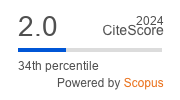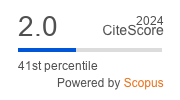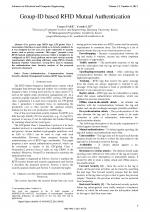| 4/2013 - 2 |
Group-ID based RFID Mutual AuthenticationPARK, Y. |
| Extra paper information in |
| Click to see author's profile in |
| Download PDF |
Author keywords
authentication, communication system security, identity management systems, RFID tags, security
References keywords
rfid(22), authentication(15), privacy(11), protocol(9), percom(8), mutual(7), security(6), tags(4), systems(4), hash(4)
Blue keywords are present in both the references section and the paper title.
About this article
Date of Publication: 2013-11-30
Volume 13, Issue 4, Year 2013, On page(s): 9 - 12
ISSN: 1582-7445, e-ISSN: 1844-7600
Digital Object Identifier: 10.4316/AECE.2013.04002
Web of Science Accession Number: 000331461300002
SCOPUS ID: 84890175010
Abstract
For passive type RFID tags, EPCglobal Class 1 Generation-2 Revision is used widely as a de facto standard. As it was designed for low cost, it is quite vulnerable to security issues, such as privacy concerns. This paper presents a new RFID mutual authentication protocol, which is designed to be configured on EPC Gen2 platform and to meet various security requirements while providing efficiency using PRNG (Pseudo Random Number Generator). Group-ID is used to minimize the authentication time. Security analysis of the proposed protocol is discussed. |
| References | | | Cited By «-- Click to see who has cited this paper |
| [1] EPCGlobal Class 1 Generation 2 Revison, available at http://www.epcglobalinc.org/standards/uhfc1g2.
[2] M. Ohkubo, K. Suzuki and S. Kinoshita, "Cryptographic Approach to Privacy-friendly Tags", in Proc. RFID Privacy Workshop, MIT, 2003. [3] Burmester, M., and Munilla, J. "A Flyweight RFID Authentication Protocol", Proc. the 5th Workshop on RFID Security, 2009. [4] M. O'Neill, "Low-cost SHA-1 Hash Function Architecture for RFID Tags", Proc. RFIDSec'08, 2008. [5] R. John Robles and T. Kim, "A Review on Security in Smart Home Development", Advanced Science Letters, vol. 15, pp. 13-22, 2010. [6] A. Irshad, W. Noshairwan, M. Shafiq, S. Khurram, E. Irshad, M. Usman, "Security Enhancement in MANET Authentication by checking the CRL status of Servers", Advanced Science Letters, vol. 1, pp. 91-98, 2008. [7] N. Omer, F. Elssied, O. Ibrahim, A. Ali A.alaziz and A. Yousif, "Review Paper: Security in E-government Using Fuzzy Methods", Advanced Science Letters, vol. 37, pp. 99-112, 2011. [8] J. Cho, S. Yeo, Sung Kwon Kim, "Securing against brute-force attack: A hash-based RFID mutual authentication protocol using a secret value", Computer Communications vol. 34, no. 3, pp. 391-397, 2011. [CrossRef] [Web of Science Times Cited 95] [SCOPUS Times Cited 147] [9] T. Li, "Vulnerability Analysis of EMAP-An Efficient RFID Mutual Authentication Protocol", Proc. ARES 2007, pp. 238-245, 2007. [CrossRef] [SCOPUS Times Cited 124] [10] H. Chien, C. Chen, "Mutual authentication protocol for RFID conforming to EPC Class 1 Generation 2 standards", Computer Standards & Interfaces, vol. 29, no. 2, Pages 254-259, 2007. [CrossRef] [Web of Science Times Cited 247] [SCOPUS Times Cited 335] [11] P. Peris-Lopez, J. Cesar Hernandez-Castro, J. M. Estevez-Tapiador, A. Ribagorda, "EMAP: An Efficient Mutual-Authentication Protocol for Low-Cost RFID Tags", Proc. OTM 2006 Workshop, LNCS vol. 4277, pp. 352-361, 2006. [12] P. Peris-Lopez, J. Cesar Hernandez-Castro, J. M. Estevez-Tapiador, A. Ribagorda, "M2AP: A Minimalist Mutual-Authentication Protocol for Low-Cost RFID Tags", Ubiquitous Intelligence and Computing, LNCS vol. 4159, pp. 912-923, 2006. [CrossRef] [SCOPUS Times Cited 262] [13] S. Kang, D. Lee, I. Lee, "A study on secure RFID mutual authentication scheme in pervasive computing environment", Computer Communications, vol. 31, no. 18, pp. 4248-4254, 2008. [CrossRef] [Web of Science Times Cited 29] [SCOPUS Times Cited 46] [14] R. Paise, S. Vaudenay, "Mutual authentication in RFID: security and privacy", in Proc. of ASIACCS '08, pp. 292-299, 2008. [CrossRef] [SCOPUS Times Cited 115] [15] H. Chien, "SASI: A New Ultralightweight RFID Authentication Protocol Providing Strong Authentication and Strong Integrity", IEEE Trans. on Dependable and Secure Computing, vol. 4, no. 4, pp. 337- 340, 2007. [CrossRef] [Web of Science Times Cited 319] [SCOPUS Times Cited 448] [16] Y. Lee, Y. Park, "A New Privacy-preserving Path Authentication Scheme using RFID for Supply Chain Management", Advances in Electrical and Computer Engineering, vol. 13, no. 1, pp. 23-26, 2013. [CrossRef] [Full Text] [Web of Science Times Cited 6] [SCOPUS Times Cited 7] [17] T. Li, W. Luo, Z. Mo, and S. Chen, "Privacy-preserving RFID Authentication based on Cryptographical Encoding" Proc. IEEE INFOCOM'12, pp. 2174-2182, 2012. [CrossRef] [SCOPUS Times Cited 40] [18] Q. Yao, Y. Qi, J. Han, J. Zhao, X. Li, and Y. Liu, "Randomizing RFID Private Authentication," Proc. IEEE PERCOM, 2009. [CrossRef] [SCOPUS Times Cited 41] [19] T. Dimitriou, "A Secure and Efficient RFID Protocol that could make Big Brother (partially) Obsolete," Proc. IEEE PERCOM, 2006. [CrossRef] [SCOPUS Times Cited 107] [20] L. Lu, J. Han, L. Hu, Y. Liu, and L. Ni, "Dynamic Key-Updating: Privacy-Preserving Authentication for RFID Systems," Proc. IEEE PERCOM, 2007. [CrossRef] [Web of Science Times Cited 53] [SCOPUS Times Cited 107] [21] L. Lu, J. Han, R. Xiao, and Y. Liu, "ACTION: Breaking the Privacy Barrier for RFID Systems," Proc. of IEEE INFOCOM, 2009. [CrossRef] [Web of Science Times Cited 28] [SCOPUS Times Cited 54] [22] L. Lu, Y. Liu, and X. Li, "Refresh: Weak Privacy Model for RFID Systems," Proc. of IEEE INFOCOM, 2010. [CrossRef] [SCOPUS Times Cited 53] [23] M. Ohkubo, K. Suzuki, and S. Kinoshita, "Efficient Hash-Chain based RFID Privacy Protection Scheme", Proc. Of UbiComp Workshop Privacy, 2004. [24] T. Dimitriou, "A Lightweight RFID Protocol to Protect Against Traceability and Cloning Attacks", in Proc. Of SecureComm, 2005. [25] D. Henrici, P Muller, "Providing Security and Privacy in RFID Systems Using Triggered Hash Chains", Proc. of IEEE PerCom, 2008. [CrossRef] [Web of Science Times Cited 20] [SCOPUS Times Cited 35] Web of Science® Citations for all references: 797 TCR SCOPUS® Citations for all references: 1,921 TCR Web of Science® Average Citations per reference: 31 ACR SCOPUS® Average Citations per reference: 74 ACR TCR = Total Citations for References / ACR = Average Citations per Reference We introduced in 2010 - for the first time in scientific publishing, the term "References Weight", as a quantitative indication of the quality ... Read more Citations for references updated on 2025-05-31 08:26 in 101 seconds. Note1: Web of Science® is a registered trademark of Clarivate Analytics. Note2: SCOPUS® is a registered trademark of Elsevier B.V. Disclaimer: All queries to the respective databases were made by using the DOI record of every reference (where available). Due to technical problems beyond our control, the information is not always accurate. Please use the CrossRef link to visit the respective publisher site. |
Faculty of Electrical Engineering and Computer Science
Stefan cel Mare University of Suceava, Romania
All rights reserved: Advances in Electrical and Computer Engineering is a registered trademark of the Stefan cel Mare University of Suceava. No part of this publication may be reproduced, stored in a retrieval system, photocopied, recorded or archived, without the written permission from the Editor. When authors submit their papers for publication, they agree that the copyright for their article be transferred to the Faculty of Electrical Engineering and Computer Science, Stefan cel Mare University of Suceava, Romania, if and only if the articles are accepted for publication. The copyright covers the exclusive rights to reproduce and distribute the article, including reprints and translations.
Permission for other use: The copyright owner's consent does not extend to copying for general distribution, for promotion, for creating new works, or for resale. Specific written permission must be obtained from the Editor for such copying. Direct linking to files hosted on this website is strictly prohibited.
Disclaimer: Whilst every effort is made by the publishers and editorial board to see that no inaccurate or misleading data, opinions or statements appear in this journal, they wish to make it clear that all information and opinions formulated in the articles, as well as linguistic accuracy, are the sole responsibility of the author.



